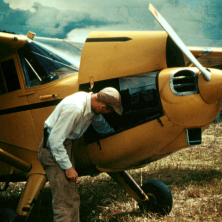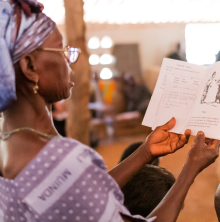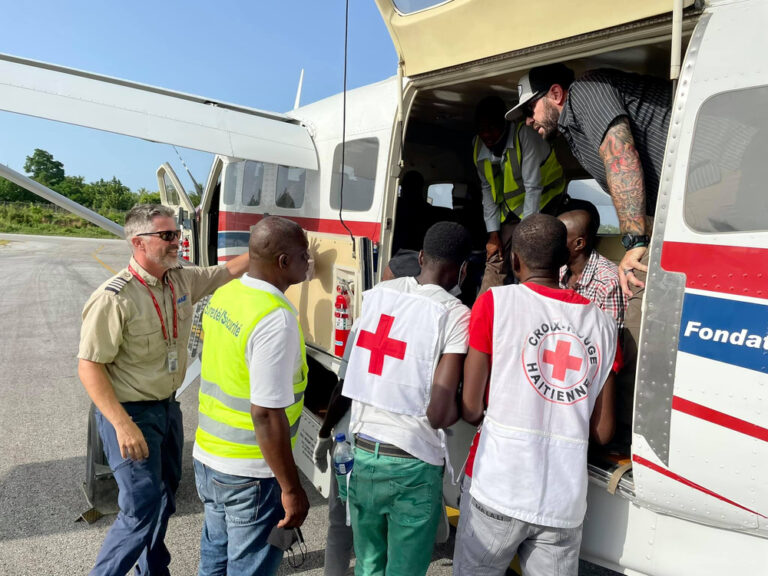Through aviation and technology, you are opening the doors for a university in the DRC.
Songs of praise bounced off concrete floors and resounded from the tin roof. A parade of officials, professors, pastors, wives, and national leaders flowed around the chapel in celebration.
This was a very special day indeed because the small village of Kikongo in the Democratic Republic of the Congo (DRC) now had a university.

The ceremony marked the inauguration of the pastoral training institute that had been led by missionaries here since 1948. Now as the Baptist University of Congo, it offers majors in theology, agriculture, and education. This is a huge opportunity for people this far out in the bush who have not had access to education to get a nationally recognized degree.
“We are working to ensure there is a pastoral presence in rural Congo,” said Glen Chapman, a longtime missionary in Kikongo with American Baptist International Ministries. “The local churches are up against a lot of syncretistic movements and sorcery, so we need theologically trained pastors who can protect the villagers from the deception of sorcery and magic and all the violence and poverty that go along with that.”

Having a university here is important because the pastoral institute was struggling—the number of students had dwindled down to about six. Many of the people who sought higher education would leave for the city and often would not return to the rural interior part of the country. This year, however, the enrollment is up to 80 students, with the hope of increasing to 150 by next year. The ability to get a full-fledged education is a huge boon in such a remote area.
The village sits on the banks of the Wamba River, nestled on the grassland at the edge of a lush jungle. The people there live off the land—residing in thatch-roofed, mud homes and eating what they farm, fish, or hunt.
“It is hard for you to really understand what rural means until you take this trip to Kikongo,” said Mike Lowery, a theology professor who lives in Kinshasa and teaches at the university.
Kikongo is at least an eight- to 12-hour drive to Kinshasa by four-wheel-drive vehicle if everything goes right—a journey that is subject to bandits, roadblocks, or being stranded on a dirt road in the middle of nowhere. An MAF flight only takes 55 minutes.

“I have made the trip by bicycle and it took three days; I have done it by canoe, and it took about 12 days,” said Glen. “MAF is always there. They are the guardian angels who can get you out if you have an immediate need to leave, like a medical emergency.”
“MAF has been instrumental in what we do,” said Mike Lowery. “You can’t really be a missionary upcountry in the Congo without some kind of air support.”
MAF has been serving the Kikongo village for about 55 years and, because of the access they provided, played a key role in the institute making progress to gain the accreditation to become a university. MAF flights not only supported the missionaries living here but brought in professors from Kinshasa to teach at the institute and now at the university.
“It is very exciting to have the university here, said Dr. Robert Nkwim, president of the Baptist University of Congo. “Thank you MAF! If you were not there, we could not come here.”
It was not only aviation that made the development of the university possible—MAF’s technology was vital.

“Through technology, MAF has been a godsend to the university and to us remaining here over the years,” said Glen. “HF radios kept us connected and, more recently, MAF helped get Internet to Kikongo through VSATs.”
This made it possible for the university to be connected to the outside world—and for Glen and his wife, Rita, to meet their granddaughter.
“We have no power besides solar power. We have no water besides the rainwater catchment, but because of MAF, I can Skype from my bedroom,” said Glen. “We have our first grandchild that we haven’t seen yet, that we aren’t going to be able to see for another year, but we can Skype with her.”
The university means pastors will be able to reach remote areas with the message of the Gospel and combat the syncretism and witchcraft pervading the hearts of the Congolese people.

“What this means for the village, what this means for the Congolese, for their children, and for the future—we get to be part of that as MAF,” said Nick Frey, manager of MAF’s WDRC program.



